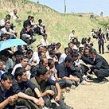
BISHKEK RESISTING TASHKENT’S PRESSURE TO RETURN ANDIJAN REFUGEES
Publication: Eurasia Daily Monitor Volume: 2 Issue: 146
By:

On July 27 more than 300 refugees from the May riots in Andijan, Uzbekistan, were transported from Jalalabad oblast to Bishkek Manas International Airport en route to a third country. The head of the Kyrgyzstan mission of the UN High Commissioner for Refugees, Carlos Zaccagnini, hopes to ultimately transfer every single Andijan refugee from Kyrgyzstan to a host country that prefers to remain unnamed. On Friday (July 29) the refugees will be sent to Romania for the next leg of their journey (Akipress, July 27). Earlier reports suggested that their destination is likely Canada, the Czech Republic, or Ukraine. According to the UN agency, there is an urgent need to remove the refugees from Kyrgyzstan before the Uzbek side tries to forcefully repatriate them.
The Kyrgyz government is still under pressure from the international community not to relinquish 29 convicts that are currently held at the Osh jail. Representatives of the Kyrgyz and Uzbek Defense Ministries are in the process of negotiating the convicts’ status. Zaccagnini, however, made it clear that at least 25 of them will be ultimately sent to a third country. Tashkent insists on the immediate handover of the other four, as they are wanted in connection with the murder of an Uzbek attorney. Their fate should be decided in the coming days (Kabar, July 27). The prospective Kyrgyz prime minister, Felix Kulov, is chairman of the Security Council’s special commission on refugee issues. Zaccagnini acknowledged the Kyrgyz government’s good treatment of the refugees, noting Bishkek’s great understanding and collaboration.
U.S. Secretary of State Condoleezza Rice has informed the Kyrgyz government that it should not send back any more refugees. If Kyrgyzstan’s newly elected President Kurmanbek Bakiyev fails to meet this demand, Rice will not attend his inauguration ceremony on August 14.
Another issue discussed on the ministerial level is the Uzbek authorities’ capture of Kyrgyz journalist Erkin Yakubjanov on July 18. Uzbek border guards detained Yakubjanov, a student at Osh State University and journalist for Azzatyk radio, while he interviewed Uzbek citizens crossing the border. The Kyrgyz Ministry of Foreign Affairs sent an official note to the Uzbek Foreign Ministry requesting a legal investigation of the case. After negotiating with the Uzbek Ambassador in Bishkek, Alisher Salahitdinov, both sides agreed to convene a meeting between security agencies to discuss broader issues of border politics.
During the two and a half months since the Andijan events, Uzbekistan — a country five times larger than Kyrgyzstan in terms of territory and population — has continuously pressured the Kyrgyz government through various means. The Uzbek officials referred to bilateral treaties on “Eternal Friendship” as the basis for denying the Andijan escapees refugee status. Tashkent arranged for the refugees’ relatives to visit Jalalabad to persuade the Uzbeks to come back. The Uzbek government also considerably expanded the activities of its secret services in southern Kyrgyzstan.
Tensions continue to grow between long-time residents of Jalalabad and the asylum seekers. There is an increasing likelihood of a violent clash, as the Andijan refugees have introduced a sense of instability in the local villagers. Numerous international reports have described the refugees’ fears and anxieties about returning to Uzbekistan and being punished by Uzbek President Islam Karimov.
Both sides have considerably tightened the border regime at the Kyrgyz-Uzbek frontier. The Uzbek government has also increased its visibility in Andijan by organizing cultural events and providing monetary credits. According to the Uzbek National Information Agency, Tashkent has set up two credit funds for local enterprises, totaling some $73 million and 5 billions Sums ($4.4 million) respectively (Akipress, July 27). The funds reportedly will provide employment for 15,000 people.
At the same time, the Uzbek security forces have detained more people accused of religious extremism. On July 25 the Tashkent City Court sentenced three members of Akramiya to 16 years of imprisonment. According to the defendants’ lawyers, all three were psychologically and physically pressured by the Uzbek court.
Further, the Uzbek secret service detained 14 men suspected of participating in Andijan riot in the Russian city of Ivanovo on July 18, including both Russian and Uzbek citizens (Fergana.ru, July 27). Russian NGOs, not the security structures, publicized the arrests.
Russia and China were among the few international actors to accept the Uzbek government’s official version of the Andijan events. All three countries are members of the Shanghai Cooperation Organization. As noted by the head of the Kyrgyz Committee on Human Rights, Ramazan Dyryldayev, the organization is comprised mainly of authoritarian states that supported former Kyrgyz president Askar Akayev’s government (Akipress, July 25).
However, by revoking the SCO’s demand that Washington set deadlines on the U.S. military presence in Central Asia following U.S. Secretary of Defense Donald Rumsfeld’s visit to Bishkek this week, and by maintaining international standards for granting political asylum at the expense of bilateral relations with Uzbekistan, the Kyrgyz government has displayed its stiff opposition to the SCO’s recent activities.




